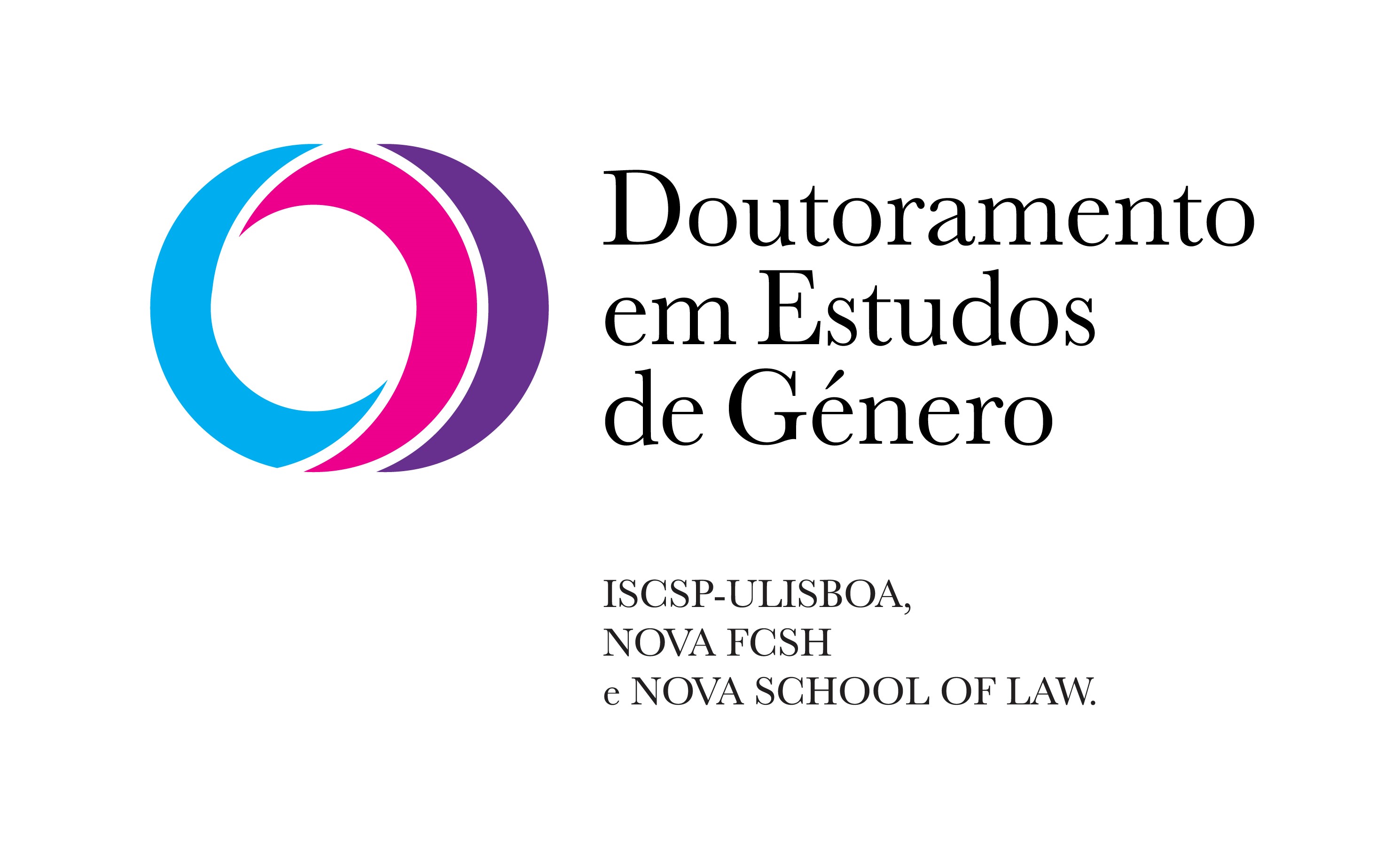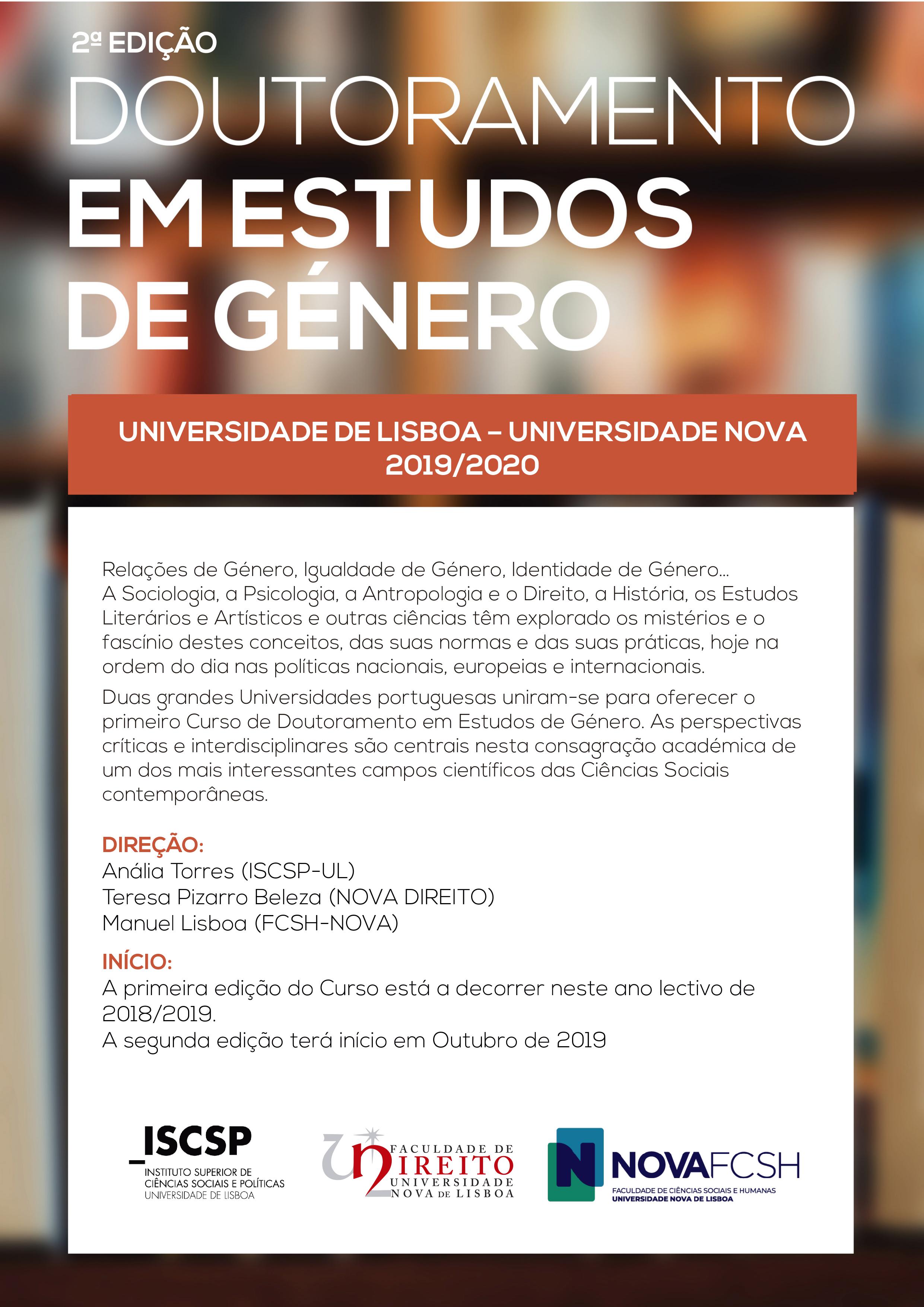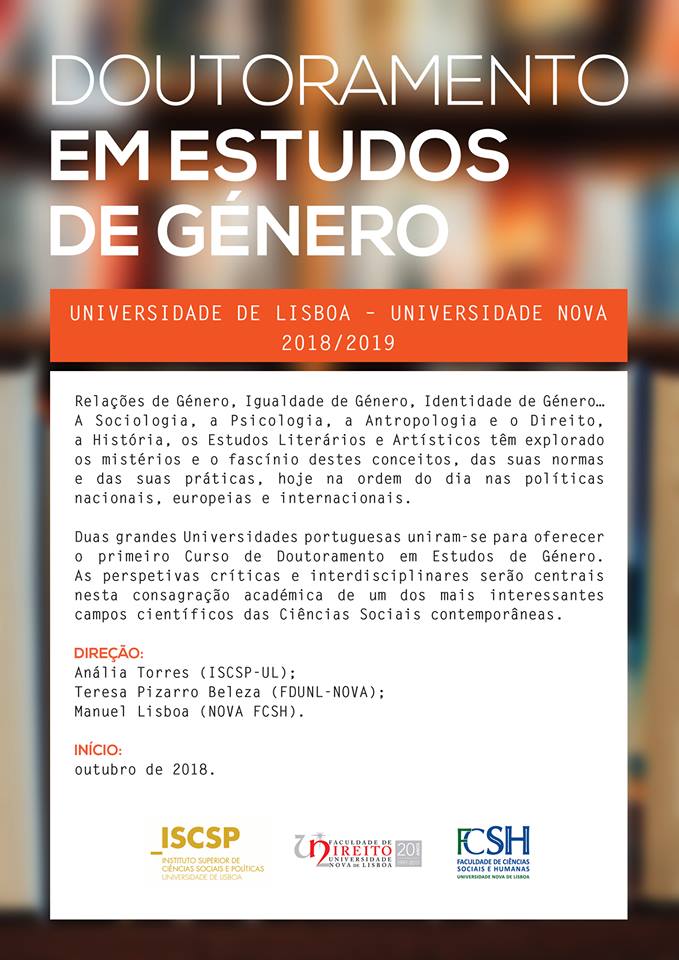
PhD on Gender Studies | 5th edition (2022/2023)
The inter-universitary programme of the PhD on Gender Studies results from a consortium between Institute of Social and Political Sciences (ISCSP-ULisboa), NOVA Faculty of Social Sciences and Humanities and NOVA School of Law.
This doctoral programme's mission is to contribute to the affirmation of Gender Studies as an autonomous scientific field of research and advanced education. Moreover, it prepares and trains researchers, other professionals, senior officials and other managers to analyse critically and reflectively themes related to gender, and then intervene in various sectors and social and political activities.
The courses and classes will take place rotationally between ISCSP-ULisboa, NOVA FCSH and NOVA School of Law.
During the 2022/2023 school year, the host institution is NOVA School of Law, at Colégio Almada Negreiros (Campolide Campus).
For more information on the application, please visit this site.
______________________________________________________________________________________________________________________________________________
PhD on Gender Studies | 4th edition (2021/2022)
The inter-universitary programme of the PhD on Gender Studies results from a consortium between Institute of Social and Political Sciences (ISCSP-ULisboa), NOVA Faculty of Social Sciences and Humanities (NOVA FCSH) and NOVA School of Law.
This doctoral programme's mission is to contribute to the affirmation of Gender Studies as an autonomous scientific field of research and advanced education. Moreover, it prepares and trains researchers, other professionals, senior officials and other managers to analyse critically and reflectively themes related to gender, and then intervene in various sectors and social and political activities.
The courses and classes will take place rotationally between ISCSP-ULisboa, NOVA FCSH and NOVA School of Law.
During the 2021/2022 school year, the host institution is NOVA FCSH.
For more information on the application, please visit this site.
______________________________________________________________________________________________________________________________________________
PhD on Gender Studies | 3rd edition (2020/2021)
The inter-universitary programme of the PhD on Gender Studies results from a consortium between Institute of Social and Political Sciences (ISCSP-ULisboa), NOVA Faculty of Social Sciences and Humanities (NOVA FCSH) and NOVA School of Law.
This doctoral programme's mission is to contribute to the affirmation of Gender Studies as an autonomous scientific field of research and advanced education. Moreover, it prepares and trains researchers, other professionals, senior officials and other managers to analyse critically and reflectively themes related to gender, and then intervene in various sectors and social and political activities.
The courses and classes will take place rotationally between ISCSP-ULisboa, NOVA FCSH and NOVA School of Law.
During the 2020/2021 school year, the host institution is NOVA FCSH.
For more information on the application, please visit this site.
______________________________________________________________________________________________________________________________________________
PhD on Gender Studies | 2nd edition (2019/2020)
The inter-universitary programme of the PhD on Gender Studies results from a consortium between Institute of Social and Political Sciences (ISCSP-ULisboa), NOVA Faculty of Social Sciences and Humanities (NOVA FCSH) and NOVA School of Law.
This doctoral programme's mission is to contribute to the affirmation of Gender Studies as an autonomous scientific field of research and advanced education. Moreover, it prepares and trains researchers, other professionals, senior officials and other managers to analyse critically and reflectively themes related to gender, and then intervene in various sectors and social and political activities.
The courses and classes will take place rotationally between ISCSP-ULisboa, NOVA FCSH and NOVA School of Law.
During the 2019/2020 school year, the host institution is ISCSP-ULisboa.
For more information on the application, please visit this site.

______________________________________________________________________________________________________________________________________________
PhD on Gender Studies | 1st edition (2018/2019)
The inter-universitary programme of the PhD on Gender Studies results from a consortium between Institute of Social and Political Sciences (ISCSP-ULisboa), NOVA Faculty of Social Sciences and Humanities (NOVA FCSH) and NOVA School of Law.
This doctoral programme's mission is to contribute to the affirmation of Gender Studies as an autonomous scientific field of research and advanced education. Moreover, it prepares and trains researchers, other professionals, senior officials and other managers to analyse critically and reflectively themes related to gender, and then intervene in various sectors and social and political activities.
The courses and classes will take place rotationally between ISCSP-ULisboa, NOVA FCSH and NOVA School of Law.
During the 2018/2019 school year, the host institution is ISCSP-ULisboa.
For more information on the application, please visit this site.

Pode fazer download desta edição aqui.
Decorreu nos dias 2 e 4 de fevereiro de 2022 o II Webinar do projeto GE-HEI – Igualdade de Género nas Instituições de Ensino Superior, em curso no CIEG.
No evento foram divulgados os objetivos e alguns resultados preliminares do projeto em curso, promovendo a disseminação do conhecimento produzido no âmbito dos Estudos de Género em contexto nacional e internacional relativamente à Igualdade de Género no Ensino Superior, e fortalecendo redes de contacto entre IES, Centros de Investigação e investigadores/as que trabalham esta temática.
O projeto GE-HEI é financiado pelo Mecanismo Financeiro do Espaço Económico Europeu, EEA Grants 2014-2021 e promovido pela Direção-Geral do Ensino Superior (DGES). Tem como entidade operadora a Comissão para a Cidadania e a Igualdade de Género (CIG), e como responsável científico o Centro Interdisciplinar de Estudos de Género (CIEG/ISCSP-Ulisboa), em parceira com o Institute for Gender, Equality and Difference at the University of Iceland (RIKK) e com a Agência de Avaliação e Acreditação do Ensino Superior (A3ES).
Os vídeos das sessões encontram-se disponíveis no canal de Youtube do CIEG, aqui.
Decorreu no dia 18 de janeiro de 2022, pelas 18h00, a Apresentação Pública do Projeto Boomerang - Estudo sobre as perceções do impacto da partilha desigual do trabalho não pago de mulheres e homens imigrantes em Portugal.
O projeto é promovido pelo Instituto Superior de Ciências Sociais e Políticas da Universidade de Lisboa (ISCSP-ULisboa) e financiado pelo Programa Conciliação e Igualdade de Género do Mecanismo Financeiro do Espaço Económico Europeu - EEA Grants. Tem como entidade operadora a Comissão para a Cidadania e a Igualdade de Género (CIG) e como responsável científico o Centro Interdisciplinar de Estudos de Género (CIEG/ISCSP-ULisboa), em parceira com a Universidade da Maia, a Universidade Aberta, a Associação Plano i, a Cruz Vermelha Portuguesa – Delegação de Braga, o SOS RACISMO e a Odalnaeringshage
CIEG's Regulation (Portuguese version only)
CIEG's Post-Doctoral Regulation (Portuguese version only) | ISCSP's Post-Doctoral Regulation | Post-Doctoral Programmes in ISCSP-ULisboa
Internship's Regulation (Portuguese version only)
Gender Studies Collection - Manual (Portuguese version only)
This email address is being protected from spambots. You need JavaScript enabled to view it.
Sociologist, Researcher at the Interdisciplinary Center for Gender Studies (ISCSP/ ULisboa) since 2021. Has a PhD in Sociology from the University of Lisbon, Institute of Social Sciences (ICS-ULisboa), a Master in Sociology of Family, Education and Social Policy and a Degree in Sociology, both from ISCTE - University Institute of Lisbon.
She has recently published the book Gender and Transgression with the support of TRANSRIGHTS project, coordinated by Doctor Sofia Aboim (ERC Consolidator Grant no.: 615594) at ICS-ULisboa. In addition, she has 2 book chapters and 6 scientific articles in international journals with peer review. In 2021 she received a special mention for the paper "Misrecognizing gender: beyond binary accomplishments", which was the runner-up in the 1st edition of the Young Scholar Award of the European Sociological Association (ESA).
She is interested in different theoretical and methodological approaches, investing particularly in the study of phenomena and problems related to gender differences and inequalities, order and transgression, feminism, educational contexts and social exclusion. Since 2009 she has been contributing to many different and remarkable projects, having passed through several research centres and learning contexts that have greatly enriched her.
Links:
https://www.researchgate.net/profile/Sara_Merlini
https://lisboa.academia.edu/SaraMerlini
https://eurogender.eige.europa.eu/users/sara-merlini
IDs:
Ciência ID: 4211-EE32-3D88
ORCID iD: 0000-0003-2566-4543
Major in Philosophy (FLL), Master and Doctor in Contemporary Art History (FCSH/NOVA)). Integrated researcher at IHA/FSCH/NOVA and associated researcher at the Social Sciences and Humanities Research Council project (University of Victoria, British Columbia, Canada), and at CIEG/ISCSP-ULisboa.
Art Historian, lecturer, curator, art educator, fiction writer. Since December 2017, she is the Director of the National Museum of Contemporary Art (Lisbon).
Author of, among other volumes, Paula Rego. Rehearsal. Essay on Love (2019), Lisboa em Festa. The retrospective exhibition of Portuguese and (Spanish Ornamental Art, 1882. Antecedents of a Museum (2017), Paula Rego or Alice's Vertigo (2011), 10 volumes on Modern and Contemporary Art: My first collection, first Portuguese collection on the subject destined to young readers (2014), as well as hundreds of texts on museums, education, gender issues, Portuguese art and artists, dictionary entries and chapters in national and international books. Co-editor with Raquel Henriques da Silva and Joana d'Oliva Monteiro, of the Dictionary Who’s who in Portuguese museology. Lisbon: Art History Institute of the Faculty of Social and Human Sciences/Nova, 2019 and 2021 and co-editor with Carlos João Correia of Aesthetics, Art and Intimacy. Lisbon, CFUL, 2021.
This email address is being protected from spambots. You need JavaScript enabled to view it.
Mafalda Gonçalves Ferreira holds a master's degree in Legal Medicine from the Abel Salazar Institute of Biomedical Sciences - University of Porto (ICBAS) and is currently a PhD student in Forensic Sciences at the Faculty of Medicine of the University of Porto (FMUP). She is the main investigator in the study IRIS - Life Trajectories of LGBTI People Victims of Domestic Violence, funded by POISE and is part of the national team of the research project “Sexual Violence in Intimate Relationships”, promoted by the Commission for Citizenship and Gender Equality (CIG) and funded by the European Commission. She is also a member of the Interdisciplinary Center for Gender Studies (CIEG – ISCSP-ULisboa), of the responsible teams for the Dating Violence Observatory, National Bullying Observatory, Ponto Lilás initiative and is part of the Plano i Association's Communication Team. She also performs training actions on Gender Equality and Violence. Previously, she performed technical and researcher functions in the UNi+ and UNequality I and III Programs, and was the executive coordinator of UNi+ 2.0 Program for the Prevention of Violence in Dating in the University Context and UNequality II - Program for the Promotion of Equality and Social Diversity and Prevention of Domestic and Gender Violence, financed respectively by the State Secretary for Citizenship and Equality and by the Commission for Citizenship and Gender Equality.
News/ Events
CIEG's activities